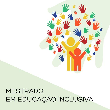Banca de QUALIFICAÇÃO: MARLI DE FÁTIMA DA SILVA
Uma banca de QUALIFICAÇÃO de MESTRADO foi cadastrada pelo programa.DISCENTE : MARLI DE FÁTIMA DA SILVA
DATA : 28/06/2024
HORA: 08:00
LOCAL: https://meet.google.com/vjj-zbuw-vty
TÍTULO:
Analysis of the potential of mobile applications available as an instrument for teaching students with non-verbal Autism Spectrum Disorder
PALAVRAS-CHAVES:
Teaching and learning; Assistive Technology, Autism Spectrum Disorder.
PÁGINAS: 90
GRANDE ÁREA: Ciências Humanas
ÁREA: Educação
RESUMO:
The present research aims to investigate the potential of mobile applications as a pedagogical tool in the development of learning of students with non-verbal Autism Spectrum Disorder (ASD). Specifically, it is intended to evaluate and identify which characteristics of applications can be effective for learning. To achieve these goals, the research takes a qualitative approach.First, a comprehensive review of the literature on the use of assistive technologies and mobile applications in the education of children with ASD was conducted. This review provided the necessary theoretical basis to understand the current state of the pedagogical practices used by SEA (Specialized Educational Service) teachers in early childhood education, alternative and augmentative communication resources used in the Multifunctional Resource Room, verifying what difficulties faced by teachers in Teaching Learning in the development of communication of children with non-verbal ASD in Early Childhood Education.Subsequently, a diverse set of applications focused on different skills, such as communication, social skills, and cognitive skills, was selected. The selection of applications was meticulous, analyzing their educational functionalities.This study included interviews with teachers from the Specialized Educational Service of the multifunctional resource rooms that work with children with ASD in Early Childhood Education in the municipality of Tangará da Serra. These professionals provided insights into the use of assistive technologies and mobile applications in pedagogical work with children with nonverbal ASD.A qualitative analysis of the interviews was carried out and observations were conducted to identify how the pedagogical work is being carried out with non-verbal ASD children and how the use of applications can help in the teaching, learning and communication of these children. The collected data were analyzed to identify what could inform more effective pedagogical practices. Preliminary results suggest that mobile apps have significant potential to support the development of cognitive and social skills in children with nonverbal ASD. With the features such as interactivity, immediate feedback and the possibility of customization seem to be effective. In addition, teachers reported that the apps helped engage children in ways that traditional methods could not.
MEMBROS DA BANCA:
Presidente - 253581001 - SUMAYA FERREIRA GUEDES
Interna - 94289008 - CHIARA MARIA SEIDEL LUCIANO DIAS
Interno - 95937004 - ROBSON ALEX FERREIRA
Externa à Instituição - VALQUIRIA PERASSOLO - SEDUC-MT



